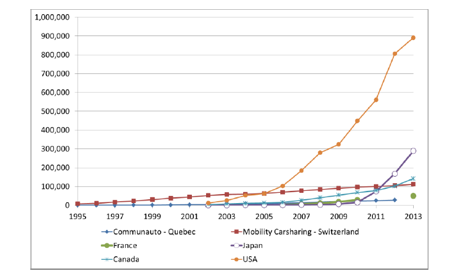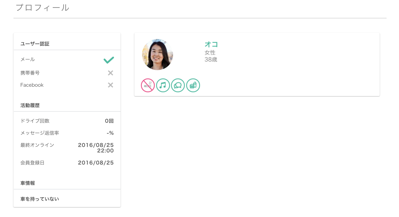Naoko ABE
How can we understand the differences between France and Japan in the growth of shared mobility services? The paradox of trust and its social construction
Context
The new mobility services based on “sharing” (car-sharing or carpooling) are booming in both France and Japan. This phenomenon is clearly linked with an expansion of the new socio-economic style called the cooperative economy that rests on the fact that access to use prevails over property. [[i]]
Table: Evolution of the number of car-sharing subscribers in different countries [[ii]]

One of the characteristics of shared mobility is that the service is based on sharing a car (car-sharing) or a travel (carpooling) with strangers. Car-sharing is a system of sharing a vehicle between relatives, friends, but also strangers. Carpooling is sharing a trip with strangers. The practice of service rests above all on trust in others and the acceptability of unknown people. Although the number of shared mobility services is increasing in France and Japan (see Table), we can generally observe differences in the way these services are growing. For instance, in Japan, the car-sharing service B to C (Business to Consumer) is more developed (e.g. 846,240 subscribers and 19,717 vehicles in 2016)[[iii]] than the carpooling service, while in France both services are growing, especially the service C to C (Consumer to Consumer) is much more expanded in France than in Japan[[iv]]. We can for example observe the remarkable growth of the "Blablacar" carpooling service in France. Various factors like governmental policy, economical, social and geographical contexts can have an impact on the service development. In this research, I will analyze differences in the development of these services with a focus on social relationship, particularly the relationship with “strangers” form a sociological standpoint.
Purpose of the research
The research aims to understand the differences between France and Japan in the development of shared mobility service by considering the question of trust in unknown people as a key to the growth of a new mobility system. For this purpose, the first section will be invested in analyzing the service and the users in both France and Japan. What kind of service exists? Who is using the service? What is the motivation when using shared mobility?
The second section will aim to investigate the service in three points as follows: societal concerns, service strategies and economical aspect, in order to pinpoint differences in the use of services in France and Japan.
1) Societal concerns:
The purposes when using shared mobility can be various. They can be economic reason (profitability of the use, cheaper than other travel modes, etc.), ecological concerns and social aspect (conviviality, friendly, etc.). Beyond personal interest, I question the impact of shared mobility on a community and its complementary role in existing transportation mode. Does the shared mobility contribute to a territorial development from economic or societal standpoints?
2) Service strategies:
Service strategy to attract or retain customers should be focused on in the research. Investigating the cultural differences in the strategy is interesting to understand the different way of using the shared service.
3) Economic aspects:
The shared mobility is often practiced by young adults. For instance, the age range of the majority of users is between 30 to 49 years old (54%) in carsharing service in France[[v]] and between 20 to 39 years old (60%) in Japan.[[vi]] The average age of carpooling users in France is 34 years old.[[vii]] Is the use of this kind of service reserved only for limited population as like young people or economically vulnerable population? Or is it expanding to all people and becoming one of the common travel modes? How does economical aspect influence the growth of service in both countries?
Once differences in development of shared mobility according to these three aspects are pinpointed, in the third section these differences will be analyzed focusing on trust issue in strangers.
1) What is the key to establish trust with strangers?
The shared service is based primarily on trusting others; “trust between strangers”[[viii]] and the acceptability of strangers. How is the relationship with strangers built during the use of the service? What fosters trust to be able to share car or trip with strangers? What kind of relationship is built in this practice of shared mobility?
2) Paradox of trust in France and Japan
France is sometimes considered as a society of defiance; “the French are suspicious of their citizens, public authorities and the market”[[ix]], while Japan would rather represent a society of trust that would nurture the culture of collectivity[[x]]. For instance, the World Values Survey indicates that to 19%[[xi]] of French people answer “yes”, compared to 37%[[xii]] of Japanese to the following question: “Generally speaking, would you say that most people can be trusted? “. However the service of shared mobility based on trust between strangers seems less developed in Japan than in France. Why this paradox? The research aims to understand this paradox and to investigate how we built trust in strangers within shared mobility context in both countries.
Methodology: comparison of the shared service platform “Blablacar” and “notteco”
I focus particularly on a carpooling service in both countries to investigate trust issue. By comparing website of the carpooling service (“Blablacar” in France and “notteco” in Japan) in both countries, I examine how each website is presented and organized and what they ask users to establish trust with strangers.
Fig. Example of Dashboard of “Blalacar” and “notteco”


In general, common elements which the C to C service employs in order to ensure the service consist of proving user identity (by email address, mobile number, Facebook, putting a photo etc.), rating users mutually and providing insurance. However slight differences in the manner that each service “Blablacar” and “notteco” asks users to do (mandatory or optional elements) are identified. I consider these differences as analysis point to understand strategy of establishing trust in strangers. Then I examine what elements play a role and contribute to build trust between strangers in both countries.
Naoko Abe received her Bachelor’s and Master’s degrees in Sociology from Paris Descartes University. She obtained a PhD in Sociology from the Ecole des Hautes Études en Sciences Sociales (EHESS) in Paris in 2012. Her PhD research was carried out in collaboration with the RATP (Parisian Public Transportation Authority) from 2008 to 2012 on subway users’ behavior by using Kinetography Laban to analyze human behavior. She obtained an advanced teaching and notation certificate in Kinetography Laban in 2011 from the Conservatoire de Paris. She was a postdoctoral fellow at the CNRS Laboratory for Analysis and Architecture of Systems from April 2014 to September 2015. She was Renault research fellow in 2016. Since October 2016, she is a research fellow at the Fondation France-Japon at the EHESS.
[[i]] Jeremy Rifkin, L’Age de l’accès, la nouvelle culture du capitalisme, Paris: La Découverte, 2005.
[[ii]] Quebec: http://www.communauto.com/images/usagers.html; Switzerland: /www.mobility.ch/fr/medias/communiques-de-presse/ ; France: CERTU, 2008, L’auto-partage en France et en Europe – état des lieux et perspectives ; Japan: Ecomo Foundation ; USA: Shaheen and Cohen, 2012, cited in Yveline Lecler, Bruno Faivre D’Arcier B., 2014, « Carsharing in cities : will electric vehicles change the business ? A comparison between France and Japan », paper presented at the 22nd International Colloquium of GERPISA, Kyoto, 4-6 June 2014.
[[iii]] « Wagakunino casyearingu syaryoudaisuu to kaiinnsu no suii [The evolution of the number of vehicles for car-sharing and the number of subscribers], Fondation for Promoting Personal Mobility and Ecological Transport, April 2016.
[[iv]] There are over 25 millions "Blablacar" subscribers according to ‘Blablacar’ website accessed on the 26 June 2016, while ‘notteko’, equivalent to ‘Blablacar’ in Japan, counts only 27000 subscribers according to the ‘notteco’ company’s survey in 2006, exchanged by email with ‘notteko’ in August 2016.
[[v]] ADEME et 6T-bureau de recherche, « Enquête nationale sur l’autopartage : l’autopartage comme déclencheur d’une mobilité alternative à la voiture particulière », Paris, January 2013.
[[vii]] ADEME et 6T-bureau de recherche, « Enquête auprès des utilisateurs du covoiturage longue distance », Paris, September 2015.
[[viii]] Rachel Botsma, Roo Rogers, What’s mine is yours. How collaborative consumption is changing the way we live, New York: HarperBusiness, 2010.
[[ix]] Yann Algan, Pierre Cahuc, La société de défiance. Comment le model social français s’autodétruit, Paris: Edition Rue d’Ulm, 2007.
[[x]] Toshio Yamagishi, Anshinsyakai kara sinraisyakai e – Nihongatashisutemu no yuku e [From a society of assurance to a society of trust – the future of Japanese system], Tokyo : Chuokoron Shinshya, 1999.
[[xi]] World Values Survey (2005-2009) Crossings by country Study # 906-WVS2005 v.2015.04.18.
[[xii]] World Values Survey (2010-2014) Crossings by country Study # 906-WVS2010 v.2015.04.18.
|












